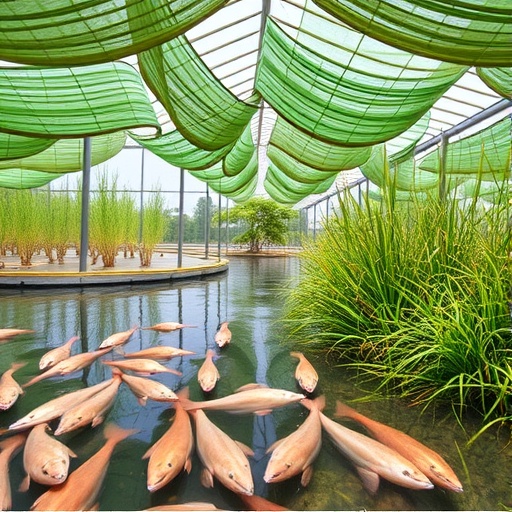Amidst the growing challenges of food security and climate change, the need for sustainable aquaculture systems has never been more critical. In the heart of Uganda’s Lake Victoria basin, researchers have embarked on a groundbreaking study that analyzes the economic performance and scalability of small-scale aquaculture systems, specifically focusing on pond, cage, and aquaponics systems. This research, conducted by Syliver, Limuwa, and Semyalo, sheds light on the practical implications of different aquaculture methodologies, providing essential insights for local farmers and international policymakers alike.
Aquaculture, often termed the blue revolution, is emerging as a pivotal solution to meet global demand for protein. In developing regions, small-scale aquaculture holds the promise of improving incomes and livelihoods while promoting environmental stewardship. However, the effectiveness of various aquaculture systems in achieving these objectives is still under scrutiny. The comparative analysis undertaken by the researchers delves deeply into the intricacies of pond-based aquaculture, cage systems, and innovative aquaponics, assessing not just their economic viability but also their environmental impacts.
Pond aquaculture has long been a staple in regions surrounding Lake Victoria. This traditional practice involves cultivating fish species in controlled freshwater environments. The researchers found that pond systems have a distinct advantage in terms of lower capital investment and operational costs. However, the reliance on natural feed inputs and variable water quality can pose substantial risks, especially in the face of climate variability. This system’s ability to produce fish at scale makes it a favorable option for many local farmers, but challenges remain in maximizing yields and ensuring sustainability.
Conversely, cage aquaculture represents a more modern approach, allowing for fish farming in open water bodies. This method utilizes floating nets or cages to house fish, benefiting from the natural water flows and ecosystems of Lake Victoria. The study revealed that while cage systems enable higher stocking densities and faster growth rates, they come with significant environmental implications, such as nutrient loading and potential risks to local biodiversity. As these systems proliferate, it becomes vital to balance economic gains with ecological integrity, ensuring that local ecosystems remain resilient.
Aquaponics, a relatively recent innovation that combines aquaculture with hydroponics, presents a fascinating alternative. By integrating fish farming with plant cultivation, aquaponics offers a closed-loop system where fish waste fertilizes plants, and plants help purify the water. The researchers highlighted that aquaponic systems can achieve impressive resource efficiency, using significantly less water than traditional farming methods. However, they also noted the complexity of managing such systems, which require specialized knowledge and infrastructure. This can be a barrier for small-scale farmers who may lack access to the necessary technology and expertise.
As the study progressed, it became clear that each system has its unique set of challenges and opportunities. The economic performance of these systems was meticulously analyzed, considering factors such as operational costs, market access, and profit margins. The researchers discovered that while pond systems may offer immediate economic returns, cage systems could yield higher profits over the long term if managed sustainably. Meanwhile, aquaponics, though requiring higher initial investments, presents the potential for diversifying income sources by allowing farmers to grow vegetables alongside fish.
The significance of market access cannot be overstated. The researchers emphasized that small-scale fishers and farmers must connect to local and regional markets to maximize their economic benefits. Initiatives that support better supply chain management, marketing strategies, and cooperative models can enhance access to markets for underserved communities, ensuring that the benefits of aquaculture extend beyond just the producers.
Moreover, the study highlighted the importance of policies and regulations that promote sustainable aquaculture practices. This means not only ensuring that fish farming operations abide by environmental standards but also encouraging practices that protect local ecosystems. Incorporating community involvement in decision-making processes can yield significant benefits, fostering a sense of ownership and responsibility among local stakeholders.
Climate change undeniably looms large over the future of aquaculture. The researchers pointed out that shifting weather patterns and increasing water temperatures pose direct threats to fish health and productivity. Adapting aquaculture practices in response to these changes is crucial for the resilience of these systems. Future research should focus on developing climate-smart aquaculture strategies that incorporate species selection, adaptive management practices, and innovative technologies.
The insights gained from this comparative analysis carry implications far beyond the Lake Victoria basin. They serve as a template for understanding the complexities of small-scale aquaculture systems in diverse environmental and socio-economic contexts. As governments and organizations around the world seek to bolster food security and promote sustainable practices, the findings from this research provide a vital reference point.
In conclusion, the economic performance and scalability of small-scale aquaculture systems in Uganda represent a microcosm of global aquaculture challenges and opportunities. By diving deep into the nuances of pond, cage, and aquaponics systems, this study not only highlights the importance of sustainable practices but also invites further exploration into innovative solutions that could shape the future of food production. Such endeavors will be essential not just for local communities but for the global population that increasingly turns to aquaculture as a solution to food scarcity. The journey towards sustainable aquaculture is just beginning, and the insights shared in this research will undoubtedly fuel ongoing discussions and initiatives in the arena of sustainable food systems.
Subject of Research: Economic performance and scalability of small-scale aquaculture systems in Uganda.
Article Title: Economic performance and scalability of small-scale aquaculture systems: a comparative analysis of pond, cage, and aquaponics systems in the Lake Victoria basin, Uganda.
Article References:
Syliver, B., Limuwa, M. & Semyalo, R. Economic performance and scalability of small-scale aquaculture systems: a comparative analysis of pond, cage, and aquaponics systems in the Lake Victoria basin, Uganda.
Discov Sustain 6, 1227 (2025). https://doi.org/10.1007/s43621-025-02147-z
Image Credits: AI Generated
DOI: https://doi.org/10.1007/s43621-025-02147-z
Keywords: small-scale aquaculture, economic performance, sustainability, environmental impact, Lake Victoria, Uganda, aquaponics, market access, climate change, food security.




